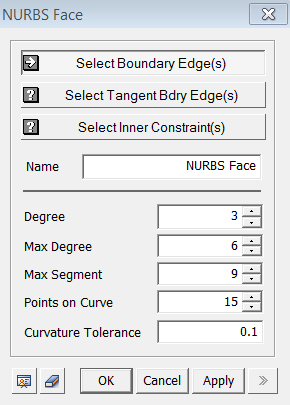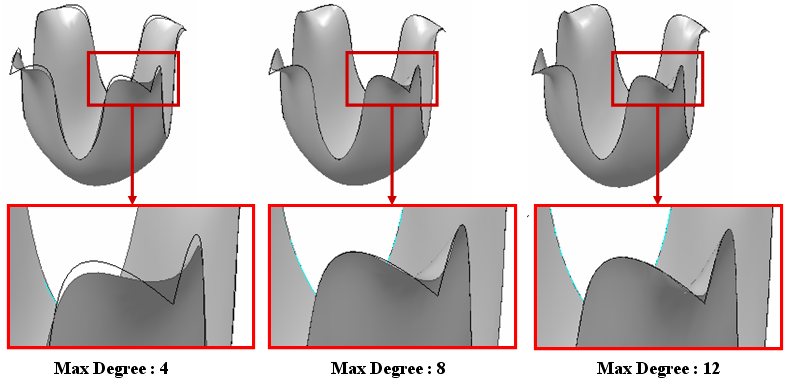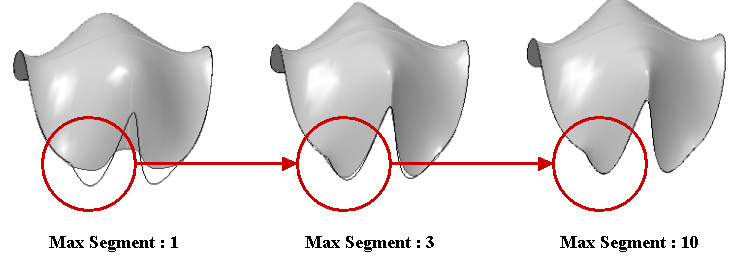Surface: NURBS Face

Function
NURBS Face creates a 3-dimensional curved surface by filling in a shape bounded by and closed in by a number of edges. Inner constraints can be specified. Tangent boundary edges, which maintain the continuity of the curvatures with adjacent faces, can be also assigned.
Call
Geometry > Surface > Create > NURBS Face

<NURBS Face>
Select Boundary Edge(s)
Select
boundary lines (Edge) within which
a surface will be created. There is no restriction
on the number of edges as long as the edges are closed and do not overlap.
Select Tangent Bdry Edge(s)
Tangent
boundary edge(s) are specified to maintain the continuity of the curvature
of contiguous faces. Tangent Boundary thus must be edges, which make up
the contiguous faces. When Tangent Boundary Edge(s) is defined, they must
be excluded from defining the Tangent Boundary Edge(s). That is, an edge
can not be defined in both Boundary Edge and Tangent Boundary Edge.
Select Inner Constraint(s)
The
curvature of a surface can be controlled by entering Constraint (Vertex, Edge). The surface being created
will encompass the Constraint. The Inner Constraint must exist within
the general range of the surface to be created. If the Constraint is too
far beyond the range of the Boundary Edge(s), the Constraint may be ignored.
Name
Enter
the name of the surface to be created.
NURBS Patch Variables
Degree
Enter the degree of a NURBS Face. If the degree is 1, the NURBS Face becomes identical to Plane Face. The higher the degree we specify, the larger the degree of curvature becomes. Normally, 3 is appropriate for the degree. An appropriate value may be selected according to the degree of Boundary Edge(s). For instance, if the Boundary Edges are simple lines, arcs, etc., the degree of 2 may be even sufficient. It is generally recommended that the degree of 3 be used and the generated NURBS Face be previewed. If an improper shape has been created, the degree may be adjusted as necessary.
Max Degree
Enter
the Maximum Degree that a NURBS Face can have. The
overall curvature is determined by Degree. Max
Degree however is used when it is inevitable to use a higher Degree to
achieve an entire NURBS Face.
Max Segment
For
a complex curved surface, the entire curved surface is segmented into
curved sub-surfaces in order to create a NURBS Face. Max
Segment is the number of divisions. A higher number
for Segment helps create a complex curved surface. However,
the computation time will be extended.
Point on Curve
Divide
the Boundary Edges for computing a NURBS Face. The
higher the number of segments we specify, the longer it takes to compute
the NURBS Face.
Curvature Tolerance
Tolerance represents the margin of error permitted in coinciding the Boundary Edge(s) and the generated NURBS Face. Although it is better to have a larger tolerance, too large a value will take excessive computation time and may even cause a failure in generating a NURBS Face.
The default values provided in the dialog box are usually suitable and reasonable for normal modeling. Except for Degree, changing to improper values may take a long time to generate a NURBS Face and lead to problems in subsequent modeling.
Notes
NURBS Face is the optimum method to create a desired curved surface. However, the edges used for creating the surface and the edges of the generated surface may not coincide. Thus, there may be cases where we need to specify a larger Tolerance than the default for operations such as Sewing faces, which include NURBS Faces.
Sometimes, shapes are not shaded when the Preview button is pressed after selecting edges. In that case, incorrect Shapes will be created. It is suggested that the operation be terminated and extra steps be taken, such as dividing the edges followed by creating faces by different ways. If there is no proper solution, create an incorrect face first and modify the shape using the Fix Shape command under the Repair Factory.
Degree is a parameter, which determines the overall shape of the curvature. For improper curvature, adjusting Degree is effective. If the generated curved surface deviates from the boundaries or contains local deficiencies, selective adjustments in Max Degree, Max Segment and Point on Curve will improve the quality. Refer to the guidelines below.


